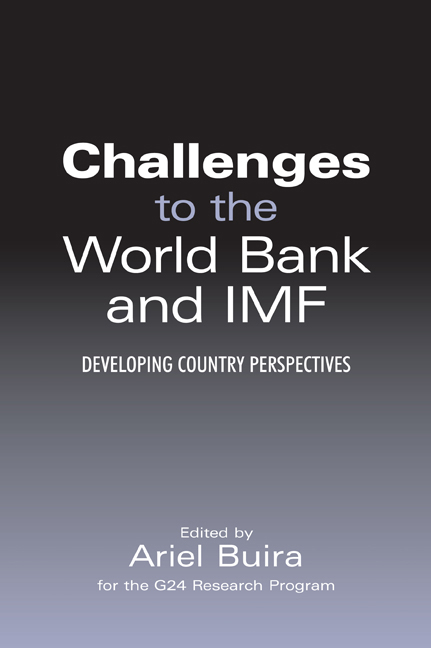Book contents
- Frontmatter
- Contents
- Contributors to this volume
- Foreword
- Introduction
- 1 The Governance of the IMF in a Global Economy
- 2 Who pays for the IMF?
- 3 An Analysis of IMF Conditionality
- 4 Achieving Long-Term Debt Sustainability in Heavily Indebted Poor Countries (HIPCs)
- 5 The Poverty Reduction Strategy Paper Approach: Good Marketing or Good Policy?
- 6 Capital Management Techniques in Developing Countries
- 7 International Reserves to Short-Term External Debt as an Indicator of External Vulnerability: The Experience of Mexico and Other Emerging Economies
- 8 Mechanisms for Dialogue and Debt-Crisis Workout that Can Strengthen Sovereign Lending to Developing Countries
- 9 Developing a Global Partnership for Development
- 10 International Financial Institutions and International Public Goods: Operational Implications for the World Bank
- Index
Foreword
Published online by Cambridge University Press: 10 September 2020
- Frontmatter
- Contents
- Contributors to this volume
- Foreword
- Introduction
- 1 The Governance of the IMF in a Global Economy
- 2 Who pays for the IMF?
- 3 An Analysis of IMF Conditionality
- 4 Achieving Long-Term Debt Sustainability in Heavily Indebted Poor Countries (HIPCs)
- 5 The Poverty Reduction Strategy Paper Approach: Good Marketing or Good Policy?
- 6 Capital Management Techniques in Developing Countries
- 7 International Reserves to Short-Term External Debt as an Indicator of External Vulnerability: The Experience of Mexico and Other Emerging Economies
- 8 Mechanisms for Dialogue and Debt-Crisis Workout that Can Strengthen Sovereign Lending to Developing Countries
- 9 Developing a Global Partnership for Development
- 10 International Financial Institutions and International Public Goods: Operational Implications for the World Bank
- Index
Summary
The research program of the Group of 24 is the world's only research effort devoted to evaluating the international economic system from the perspective of developing nations’ needs. Multilateral development banks and other research organizations may put out a larger volume of studies, but their mandate and intended audience are not as clearly defined as the G24’s. This makes the papers produced under the auspices of the G24 very special. Nowhere is the voice of the developing nations expressed as cogently and powerfully as in these papers.
This volume continues a tradition of dissemination that has long been part of the G24 agenda. It includes chapters on some of the most burning issues on the agenda: reform of the IMF and its conditionality, debt workouts and restructuring, management of capital flows, efficacy of self-insurance against crises, debt sustainability in the HIPC countries, poverty-reduction strategy papers (PRSP), international public goods, and the Millennium Development Goals and the ‘global partnership for development’. Readers will find fresh and controversial perspectives in each of these chapters.
Separating hype from fact and promise from reality has always been a hallmark of the G24 research tradition. If you are doubtful that there exist effective mechanisms for improving the governance of the IMF and its conditionality, read the chapters by Buira. If you believe that the HIPC initiative has a solid chance of placing poor countries on the path of debt sustainability, read the chapter by Gunter. If you think the World Bank's PRSP approach is based on solid economic and statistical reasoning, read the chapter by Levinsohn. If you think financial markets have become so integrated that prudential controls on capital flows have become unfeasible, read the chapter by Epstein, Grabel and Jomo. If you are of the view that the IMF's proposal of a Sovereign Debt Restructuring Mechanism (SDRM) is harmful to ‘emerging’ economies, read the amended version that is offered in the chapter by Herman.
I hope the reader will not stop with individual chapters but take the volume in its entirety. It is a gripping reminder of the long road we need to travel before the governance of the world economy becomes truly hospitable to the aspirations of the developing world.
- Type
- Chapter
- Information
- Challenges to the World Bank and IMFDeveloping Country Perspectives, pp. ix - xPublisher: Anthem PressPrint publication year: 2003



